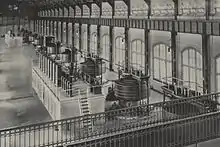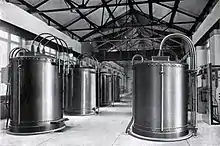Adams Power Plant Transformer House
Adams Power Plant Transformer House in Niagara Falls, New York is a National Historic Landmarked building constructed in 1895. It is the only remaining structure that was part of the historic Edward Dean Adams Power Plant, the first large-scale, alternating current electric generating plant in the world, built in 1895. The building's eponym was Edward Dean Adams, a businessman and entrepreneur in the electrical field.
Adams Power Plant Transformer House | |
 Adams Power Plant, with transformer house in left foreground | |
 | |
| Location | Niagara Falls, NY |
|---|---|
| Coordinates | 43°4′54.35″N 79°2′34.21″W |
| Built | 1895 |
| Architect | McKim, Mead, and White |
| Architectural style | Beaux-Arts architecture |
| NRHP reference No. | 75001212 |
| NYSRHP No. | 06340.000047 |
| Significant dates | |
| Added to NRHP | June 1, 1975[1] |
| Designated NHL | May 4, 1983[2] |
| Designated NYSRHP | June 23, 1980 |
History
The Adams power plant followed an 1886 plan by engineer Thomas Evershed to tap the power of Niagara Falls, which involved a "hydraulic canal" and a 7,500 feet (2,300 m) brick-lined tunnel, when the Niagara Falls Power Company was formed. The Cataract Construction Company, a new company formed to exploit the opportunity, led by president Edward Dean Adams, first formed the International Niagara Commission in 1890 to come up with a plan for harnessing the Falls. The Commission favored electricity, but could not recommend a solution to Cataract.[3]


In 1892, George Forbes was hired as a technical consultant and in May 1893 he convinced the company to build a hydroelectric system based on polyphase alternating current. Westinghouse Electric was subcontracted to build 5,000 horsepower (3,700 kW) 25 Hz[4] AC generators, based on the work of Nikola Tesla and Benjamin G. Lamme, while the I. P. Morris Company of Philadelphia built the turbines based on the design of the Swiss company Faesch and Piccard.[3]
The power plant went into operation on August 25, 1895. The transformer house building was designed by the architectural firm of McKim, Mead, and White. Locally quarried limestone was used in its construction.[3] The transformer house was "built on the upper river, above deep excavations housing twenty-one generating units. Tailwater from the generators passed into a 7000-ft tailrace tunnel, which conveyed the water beneath the city to the lower river, near the present-day site of the Rainbow Bridge. The 18-ft by 21-ft tunnel required over 3 years to build, used more than 16 million bricks in a four-course lining. It also cost the lives of twenty-eight workers."[5]
The Niagara Power Station No. 1, as it was then called, would eventually generate 50,000 horsepower (37 MW) of electricity. There were 10 generator rated 5,000 horsepower (3.7 MW) of the outside revolving field, vertical shaft type. The generators were separated into two banks of five generators each with independent switchboards. The output was at 2,000 volts to serve in and around Niagara Falls. There were transformers to step up the voltage to 10,000 volts to serve the medium distance around Niagara Falls areas. The voltage was also stepped up to 20,000 to serve the longer distance for Buffalo, Lockport, and Tonawanda. The station was the model for a second similar station built in 1904.[6] The entire plant was officially named after Edward Dean Adams in 1927.
The original Westinghouse generators remained in operation in the transformer house until the plant closed in 1961,[3] having been replaced by the Robert Moses Niagara Power Plant and the Lewiston Pump-Generating Plant.
The building was added to the National Register of Historic Places in 1975 and was designated a National Historic Landmark in 1983 and an IEEE Milestone in 1990.[2][3][7] It is located off 15th St., just south of Buffalo Avenue. It is a major contributing feature to the Niagara Falls National Heritage Area.[8]
Gallery
 From the North, March 25, 2009
From the North, March 25, 2009 From the Southeast
From the Southeast From the South
From the South Roof in disrepair from the South
Roof in disrepair from the South
See also
References
- "National Register Information System". National Register of Historic Places. National Park Service. January 23, 2007.
- "Adams Power Plant Transformer House". National Historic Landmark summary. National Park Service. September 10, 2007. Archived from the original on October 13, 2007.
- Christian, Ralph J.; James Gardner (September 9, 1978). "National Register of Historic Places Inventory-Nomination: Adams Power Plant Transformer House" (pdf). National Park Service.
{{cite journal}}: Cite journal requires|journal=(help) and Accompanying photos, exterior and interior, from 1978. (2.61 MB) - Harnessing Niagara Edison Tech Center
- Richard R. Roll (Fall 2000). "Niagara Falls: from honeymoon to Love Canal and back". Clearwaters, Vol. 30, No. 3. New York Water Environment Association, Inc. Archived from the original on August 22, 2007. Retrieved October 31, 2007.
- "Inside an American Factory". The Library of Congress. Archived from the original on March 3, 2014. Retrieved February 27, 2014.
- "Milestones:Adams Hydroelectric Generating Plant, 1895". IEEE Global History Network. IEEE. Retrieved July 29, 2011.
- "History and Culture". Niagara Falls National Heritage Area. National Park Service. Retrieved March 15, 2012.
External links
- "Power The Gift of Niagara", by John Aiken and Richard Aiken, Buffalo and Erie County Historical Society, Adventures in Western New York History, volume X, 1962, (downloadable from http://bechsed.nylearns.org/, click on Adventures in WNY History)
- Historic American Buildings Survey (HABS) No. NY-6150, "Edward D. Adams Station Power Plant, Niagara River & Buffalo Avenue, Niagara Falls, Niagara County, NY", 15 photos, 2 photo caption pages
- The Adams Power Station and Important Dates for NIAGARA FALLS
- A Contrarian History of Early Electric Power Distribution, IEEE